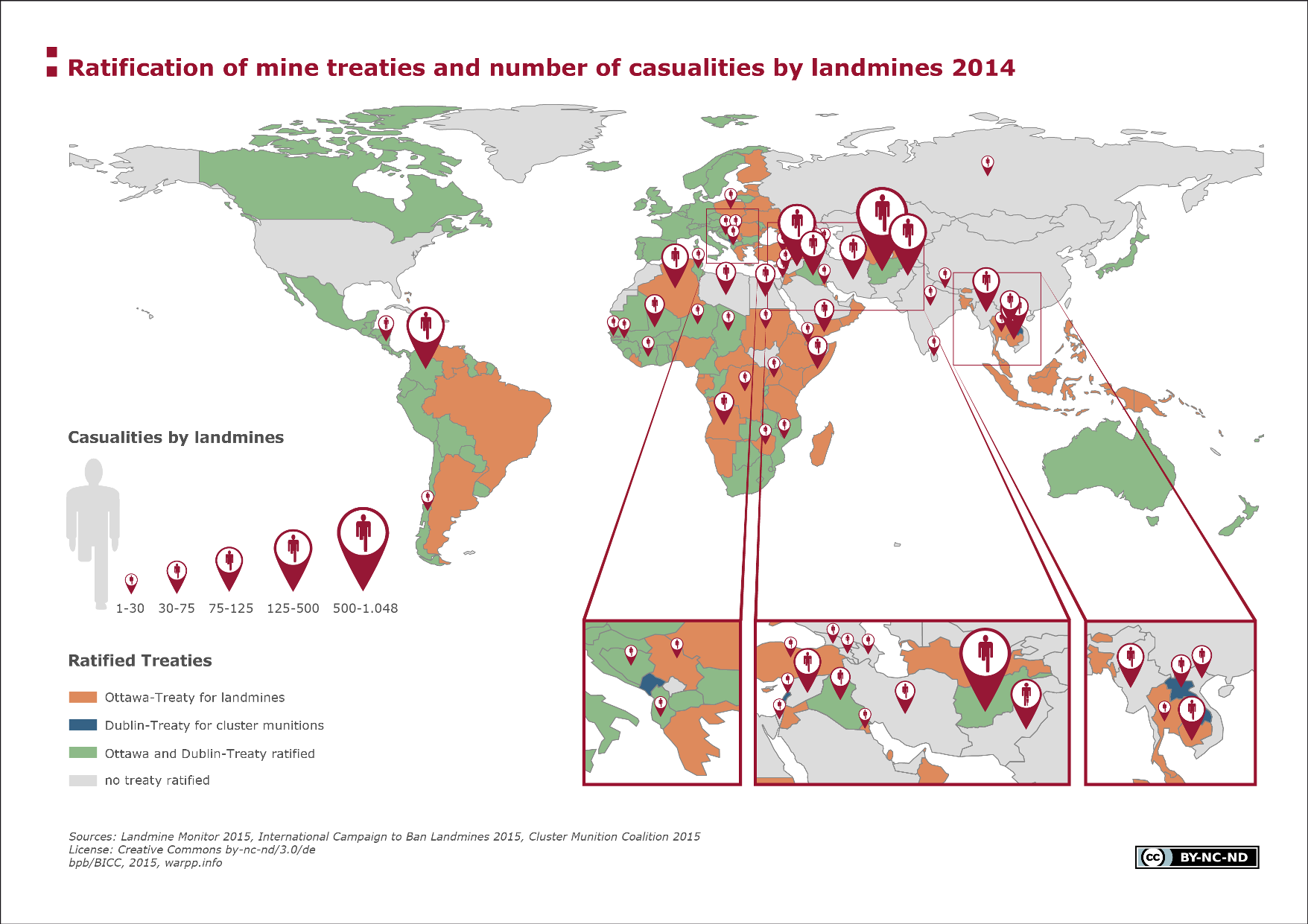Ratification of landmine conventions and numbers of victims of landmines

The map shows a global survey of the ratification of landmine and cluster munition conventions in 2015. Countries coloured in orange have only ratified the Mine Ban Treaty, countries coloured in blue have only ratified the Convention on Cluster Munitions. Countries that have ratified both convention are coloured in green, Countries that have not embedded any of the two conventions in their national legislation are coloured in grey. This map also shows the victims of land and cluster mines in relation to the number of victims in the respective countries for 2013.
Facts
Currently, more than 80 percent of the countries worldwide, that is 162 (09 December 2015) have ratified the Mine Ban Treaty 98 countries have ratified the Convention on Cluster Munitions, with an additional 20 countries having acceded to but not ratified it.
In the past, landmines were produced by more than 50 countries. Today, 11 countries are left: India, Myanmar, South Korea and Pakistan produce landmines while China, Iran, Cuba, North Korea, Russia, Singapore, South Korea and Vietnam possibly produce them. There is not official information on any stop in production, and some production plants are still able to make them. None of the countries that belong to possible or confirmed producers of mines has ratified the Mine Ban Treaty.
In more than 34 countries, more than 200 types of cluster munitions were developed and produced. Many countries that have signed the Convention on Cluster Munitions have since stopped production and have declared to destroy their stockpiles. Currently, 16 countries still produce cluster munitions, amongst them Russia, the United States and Israel According to Human Rights Watch , between 2012 and 2014, at least 249 cluster munitions were used in the current war in Syria.
Terms, notes on methodology or reading aids
The term landmine refers to anti-personnel and anti-vehicle mines. People, animals or civilian cars can trigger landmines, even years after a conflict has ended. Cluster munitions are metal containers that hold hundreds of small explosive charges. Cluster bombs are dropped from an aircraft, open in the air and release their small charges that spread over a large area. Upon contact with the ground, with people or vehicles, cluster munitions are intended to explode, causing death and destruction. Typical for cluster bombs is the high rate of unexploded bombs. Nearly half of the munitions does not explode when touching the ground but remains active.
The Mine Ban Treaty entered into force in 1999 All signatory states commit themselves to never, under any circumstances, use, produce or trade anti-personnel landmines. The stockpiling of anti-personnel landmines is only permitted for special national matters. Anti-vehicle mines are not part of the Mine Ban Treaty. The Convention on Cluster Munitions entered into force in 2010 Countries that have ratified the Convention have entered the obligation never to use, produce, transfer or stockpile cluster munitions. Because of the danger that these weapons pose for civilians, human rights organizations in particular have called for a ban of these weapons.
Data sources
Landmine and Cluster Munition Monitor The Landmine and Cluster Munition Monitor is an initiative providing research for the International Campaign to Ban Landmines (ICBL) and the Cluster Munition Coalition (CMC). Since 1999, it publishes reports on landmines, cluster munitions and other explosive remnants of war on an annual basis. The ICBL is the author of these reports; Mines Action Canada has been the editor since 2004.
International Campaign to Ban Landmines – ICBL The International Campaign to Ban Landmines is a global network that works in more than 90 countries in the world for a world that is free of anti-personnel landmines. In 1997, the campaign was awarded the Peace Nobel Prize for the enforcement of the Mine Ban Treaty. On the ICBL's website, one can find a list of all countries that have ratified the Mine Ban Treaty.
International Campaign to Ban Landmines - Treaty Status
Cluster Munition Coalition (CMC) The Cluster Munition Coalition (CMC) is an international civil society movement that campaigns against the use, production, stockpiling and transfer of cluster munitions. The Coalition, active in more than 90 countries around the world, works to change the policy and legislation of governments and organizations and raise public awareness of the inhumane use of cluster munitions.
Cluster Munition Coalition - Treaty Status
Human Rights Watch [Technical Briefing Note: Use of Cluster Munitions in Syria. (Stand 09.12.2015)](https://www.hrw.org/news/2014/04/04/technical-briefing-note- use-cluster-munitions-syria)





